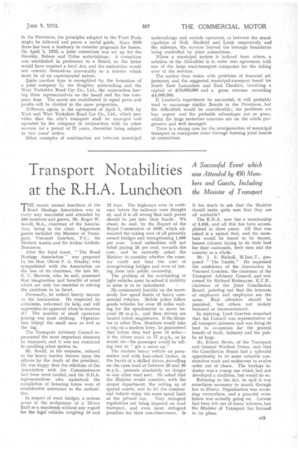A Successful Event which
Page 45

If you've noticed an error in this article please click here to report it so we can fix it.
Transport Notabilities was Attended by 450 Mem
bers and Guests, Including
at the R.H A. Luncheon the Minister of Transport
THE recent annual luncheon of the 1 Road Haulage Association was in every way successful and attended by 450 members and guests, Mr. Roger W. Sewill, M.A., chairman of the Association, being in the chair. Important guests included the Minister of Transport; Viscount Goschen, P.C.; Sir Herbert Austin and Sir Arthur GriffithBoscawen.
After the loyal toast, " The Road Haulage Association " was proposed by the Hon. Oliver F. G. Stanley, who sympathised with the Association on the loss of its chairman, the late Mr. F. C. Marston, who, he said, possessed that imagination and breadth of mind which are only too essential in solving the problems to be faced.
Personally, he wished hearty success to the Association. He respected its criticisms, welcomed its help, and will appreciate its approval when he receives it! The number of small operators joining was most striking. Organization helped the small man as well as the big.
The Transport Advisory Council represented the most important elements in transport, and it was not restricted to speaking when spoken to.
Mr. Sewill, in his response, referred to the heavy burden thrown upon the officers by the death of the president. He was happy that the relations of the Association with the Commissioners had been most cordial, and the R.H.A. representatives who undertook the completion of licensing forms were of considerable assistance to the authorities.
In respect of weak bridges, a serious point is the acceptance of a 12-ton limit as a maximum without any regard for the legal vehicles weighing 19 and 22 tons. The highways were in existence before the railways were thought of, and it is all wrong that such power should be put intO their hands. We stand, he said, by the Report of the Royal Commission of 1930, which advocated the taking over of all privately owned bridges and strengthening 1,000 per year. Local authorities will not relish paying 25 per cent, towards the cost, and he earnestly asked the Minister to consider whether the country could not bear the cost of strengthening bridges and even of taking them into public ownership.
The problem ofthe overloading of light vehicles must be solved if stability in rates is to be introduced.
He commented forcibly on the excessively low speed limits of heavy commercial vehicles. Mobile police follow goods vehicles for even 20 miles waiting for the speedometer to move beyond 20 m.p.h., and then drivers are hauled before magistrates. If the Minister or other Hon. Members would take a trip on a modern lorry, he guaranteed that before they had gone 10 miles-if the driver stuck to 17 m.p.h., as he would do—the passenger would be telling him to " get a move on."
The modern heavy vehicle on pneumatics and with four-wheel brakes, in the hands of a skilled driveratravelling on the open road at between 20 and 30 m.p.h., presents absolutely no danger to any other road user. Ile asked that the Minister would consider, with the proper department, the setting up of special courts, and to let the commercial vehicle enjoy the same speed limit as the private car. Very stringent regulations are being imposed on road transport, and even more stringent penalties for their non-observance. Is it too much to ask that the Minister should make quite sure that they are all workable?
The R.H.A. now has a membership of 5,035, and all this has been accomplished in three years. All that was asked is a square deal, and the members would be found to be decent, honest citizens trying to do their best for their customers, their men and the country as a whole.
Mr. J. S. Nicholl, M.Inst.T., proposed "The Guests." He expressed the confidence of the Association in Viscount Goschen, the chairman of the Transport Advisory Council, and welcomed Sir Richard Redmayne, K.C.B., chairman of the Joint Conciliation Board, pointing out that the interests of employers and employees are the same. Real offenders should be punished, but others not unduly harassed or inconvenienced.
In replying, Lord Goschen remarked that the Council was representative of all transport interests and was doing its best to co-operate for the general benefit of trade, industry and the public at large.
Mr. Ernest Bevin, of the Transport and General Workers Union, said that the Conciliation Board had a splendid opportunity to do some valuable constructive work and endeavour to evolve order out of chaos. The haulage industry was a young one which had not developed a tradition, but would do so.
Referring to the Act, he said it was sometimes necessary to march through law to liberty. Organization was occurring everywhere, and a peaceful revolution was actually going on. Labour had been left out of many schemes, but the Minister of Transport has listened to its pleas.




























































































